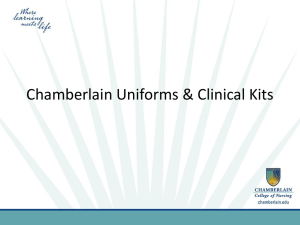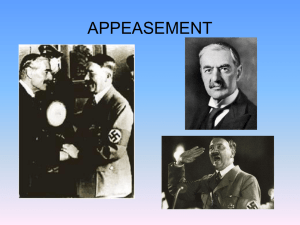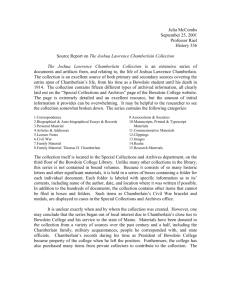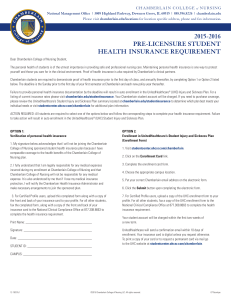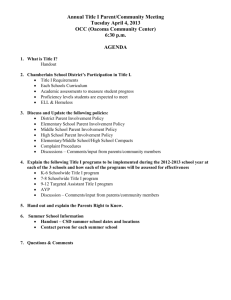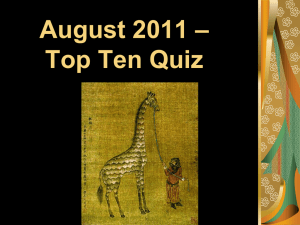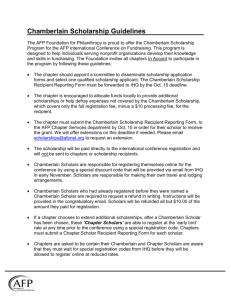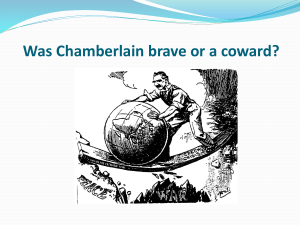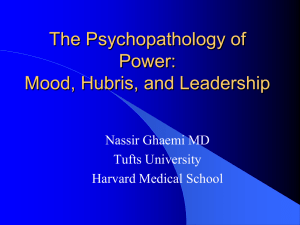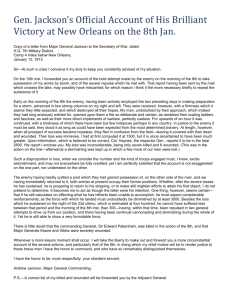Documents (8th) - History: A Cultural Approach
advertisement
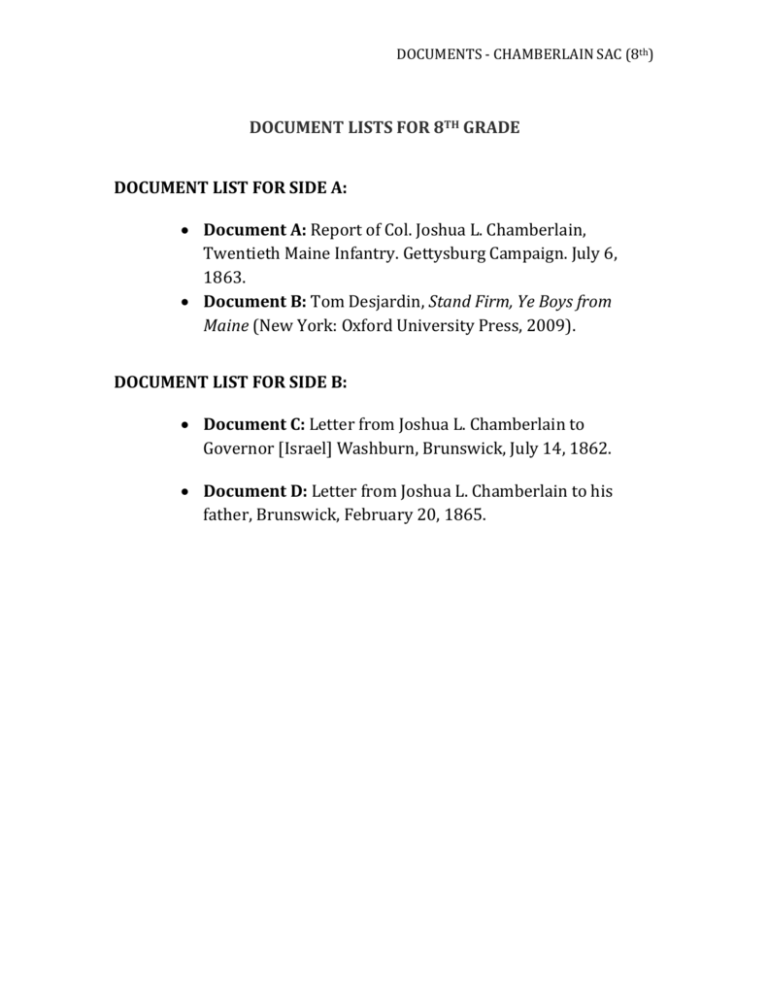
DOCUMENTS - CHAMBERLAIN SAC (8th) DOCUMENT LISTS FOR 8TH GRADE DOCUMENT LIST FOR SIDE A: Document A: Report of Col. Joshua L. Chamberlain, Twentieth Maine Infantry. Gettysburg Campaign. July 6, 1863. Document B: Tom Desjardin, Stand Firm, Ye Boys from Maine (New York: Oxford University Press, 2009). DOCUMENT LIST FOR SIDE B: Document C: Letter from Joshua L. Chamberlain to Governor [Israel] Washburn, Brunswick, July 14, 1862. Document D: Letter from Joshua L. Chamberlain to his father, Brunswick, February 20, 1865. DOCUMENTS - CHAMBERLAIN SAC (8th) DOCUMENT A (Political): Report of Col. Joshua L. Chamberlain, Twentieth Maine Infantry. Gettysburg Campaign. July 6, 1863. (MODIFIED) Colonel Vincent indicated to me the ground my regiment was to occupy, informing me that this was the extreme left of our general line, and that a desperate attack was expected in order to turn that position, concluding by telling me I was to "hold that ground at all hazards." This was the last word I heard from him. My line formed, I immediately detached Company B, Captain Morrill commanding, to extend from my left flank across this hollow as a line of skirmishers, with directions to act as occasion might dictate, to prevent a surprise on my exposed flank and rear. The artillery fire on our position had meanwhile been constant and heavy, but my formation was scarcely complete when the artillery was replaced by a vigorous infantry assault upon the center of our brigade to my right, but it very soon involved the right of my regiment and gradually extended along my entire front. We opened a brisk fire at close range, which was so sudden and effective that they soon fell back among the rocks and low trees in the valley, only to burst forth again with a shout, and rapidly advanced, firing as they came. They pushed up to within a dozen yards of us before the terrible effectiveness of our fire compelled them to break and take shelter. They renewed the assault on our whole front, and for an hour the fighting was severe. Squads of the enemy broke through our line in several places, and the fight was literally hand-to-hand. The edge of the fight rolled backward and forward like a wave. The dead and wounded were now in our front and then in our rear. Forced from our position, we desperately recovered it, and pushed the enemy down to the foot of the slope. The intervals of the struggle were seized to remove our wounded (and those of the enemy also). The enemy seemed to have gathered all their energies for their final assault. We had gotten our thin line into as good a shape as possible, when a strong force emerged from the scrub wood in the valley, as well as I could judge, in two lines in echelon by the right, and, opening a heavy fire, the first line came on as if they meant to sweep everything before them. We opened on them as well as we could with our scanty ammunition snatched from the field. DOCUMENTS - CHAMBERLAIN SAC (8th) It did not seem possible to withstand another shock like this now coming on. Our loss had been severe. One-half of my left wing had fallen, and a third of my regiment lay just behind us, dead or badly wounded. Only a desperate chance was left for us. My ammunition was soon exhausted. My men were firing their last shot and getting ready to "club" their muskets. It was imperative to strike before we were struck by this overwhelming force in a hand-to-hand fight, which we could not probably have withstood or survived. At that crisis, I ordered the bayonet. The word was enough. It ran like fire along the line, from man to man, and rose into a shout, with which they sprang forward upon the enemy, now not 30 yards away. The effect was surprising; many of the enemy's first line threw down their arms and surrendered. An officer fired his pistol at my head with one hand, while he handed me his sword with the other. Holding fast by our right, and swinging forward our left, we made an extended "right wheel," before which the enemy's second line broke and fell back, fighting from tree to tree, many being captured, until we had swept the valley and cleared the front of nearly our entire brigade. Four hundred prisoners, including two field and several line officers, were sent to the rear. These were mainly from the Fifteenth and Forty-seventh Alabama Regiments, with some of the Fourth and Fifth Texas. One hundred and fifty of the enemy were found killed and wounded in our front. DOCUMENTS - CHAMBERLAIN SAC (8th) DOCUMENT B (Political): Tom Desjardin, “American Legend, American Shrine,” in Stand Firm, Ye Boys from Maine (New York: Oxford University Press, 2009). (Modified) Unlike the other regiments of the brigade, the 20th Maine had to shift, maneuver, and protect a flank during the fight, and nothing scared Civil War soldiers more than the threat of being flanked. They accomplished this under the guidance of the newest colonel in the Fifth Corps, who performed his duties remarkably well, given his inexperience. Herein lies the key to what really made Joshua Chamberlain a hero at Gettysburg. His country awarded him the Medal of Honor for "daring heroism and great tenacity in holding his position on the Little Round Top against repeated assaults, and carrying the advance position on the Great Round Top." Neither the citation nor Chamberlain himself ever tried to depict him gloriously leading a desperate bayonet charge down the hill waving his sword over his head. That Joshua Chamberlain could stand up on the spur, given his health in the weeks prior to the battle, is itself a remarkable accomplishment. He learned from Ames the importance of instilling confidence in his men by demonstrating personal bravery and coolness in the fight and this quality did more for his victory on the spur than the legend ever recorded. In perceiving Oates' movement and bending back his left, Chamberlain placed his men so that they delivered to the Alabamians the most destructive fire they ever saw, and as the fight continued he stoically demonstrated his own confidence, walking calmly among his men. Chamberlain did all of this despite the desperate nature of the fight and while hobbled by a wound in each leg. 4 Where this confidence came from is difficult to determine. He was sick and weak. One brother was close behind. He ordered another, even nearer at hand, into a desperate place, doubting he would return unharmed. Chamberlain commanded a regiment worn from the march, inexperienced, and with half its normal officers. Neither he nor the ; regiment, save sixty-eight men of the 2nd Maine, had ever been in a standup fight before and certainly not one on a hill in the woods nearly cut off from their brigade. With all of this playing on his mind, Chamberlain suppressed youthful insecurities and doubts about his own abilities and commanded his men to legendary glory. The modern image of courageous, cool-headed Maine men sweeping the field DOCUMENTS - CHAMBERLAIN SAC (8th) with a parade ground tactical maneuver is romantic, but belies the chaotic nature of the event. While many imagine the legendary right wheel of the 20th Maine's left wing, the men who are said to have carried it out remembered something far more confused, with men running in every direction but the rear. The charge was less tactics and more instinct; adrenaline-driven rather than the result of practiced maneuvering. No parade ground, where men practiced drill until their legs ached from the effort, ever had the slope of the spur, the boulders, trees, or gaps in the line that 30 percent casualties created in the 20th Maine that day. The real significance of the charge from a military standpoint was not that it drove the Alabamians away from Little Round Top, they were ready to leave, charge or not. The rush down the sides of the spur brought into the hands of the Mainers at least ninety more captives who would otherwise have continued to fight for the Confederacy, and war is, after all, about diminishing the enemy's strength. In addition, the scattering effect of the charge on Oates and his men prevented them from holding Big Round Top as he had hoped. Though unlikely, establishing a position on the larger hill in the night might have made Little Round Top untenable for the Federals. With seven hours of darkness and proper reinforcements, there is at least a slight possibility that Oates may have had his Gibraltar after all and, in preventing this, the charge of the 20th Maine may have indirectly saved Little Round Top. DOCUMENTS - CHAMBERLAIN SAC (8th) DOCUMENT C (Social): Letter from Joshua L. Chamberlain to Governor [Israel] Washburn, Brunswick, July 14, 1862. To His Excellency Governor Washburn, In pursuance of the offer of reinforcements for the war, I ask if your Excellency desires and will accept my service. Perhaps it is not quite necessary to inform your Excellency who I am. I believe you will be satisfied with my antecedents. I am a son of Joshua Chamberlain of Brewer. For seven years past I have been Professor in Bowdoin College. I have always been interested in military matters, and what I do not know in that line I know how to learn. Having been lately elected to a new department here, I am expecting to have leave, at the approaching Commencement, to spend a year or more in Europe, in the service of the College. I am entirely unwilling, however, to accept this offer, if my Country needs my service or example here. Your Excellency presides over the Educational as well as the military affairs of our State, and, I am well aware, appreciates the importance of sustaining our Institutions of Learning. You will therefore be able to decide where my influence is most needed. But, I fear, this war, so costly of blood and treasure, will not cease until the men of the North are willing to leave good positions, and sacrifice the dearest personal interests, to rescue our Country from Desolation, and defend the National Existence against treachery at home and jeopardy abroad. This war must be ended, with a swift and strong hand; and every man ought to come forward and ask to be placed at his proper post. Nearly a hundred of those who have been my pupils, are now officers in our army; but there are many more all over our State, who, I believe, would respond with enthusiasm, if summoned by me, and who would bring forward men enough to fill up a Regiment at once. I can not free myself from my obligations here until the first week in August, but I do not want to be the last in the field, if it can possibly be helped. I am sensible that I am proposing personal sacrifices, which would not probably be demanded of me; but I believe this to be my duty, and I know I can be of service to my Country in this hour of peril. I shall acquiesce in your decision Governor, whether I can best serve you here DOCUMENTS - CHAMBERLAIN SAC (8th) or in the field. I believe you will find me qualified for the latter as for the former, and I trust I may have the honor to hear a word form you, and I remain, Yours to Command, J.L. Chamberlain To His Excellency The Governor DOCUMENTS - CHAMBERLAIN SAC (8th) DOCUMENT D (Social): Letter from Joshua L. Chamberlain to his father, Brunswick, February 20, 1865. Dear Father, I appreciate fully the view you + Mother take of the Collectorship offered me. It is natural and proper advice, + such as I certainly expected. But my own consideration of the subject has not, as yet, brought me to favor the proposal any more than at first. I owe the Country three years service. It is a time when every man should stand by his guns. And I am not scared or hurt enough yet to be willing to face to the rear, when other men are marching to the front. It is true my incomplete recovery from my wounds would make a more quiet life desirable, + when I think of my young + dependent family the whole strength of that motive to make the most of my life comes over me. But there is no promise of life in peace, + no decree of death in war. And I am so confident of the sincerity of my motives that I can trust my own life + the welfare of my family in the hands of Providence. And then as far as mere human probabilities go, my position + prospects in the Army were never better. I am now among the senior officers of my rank. And after all I have gone through, I am not willing to back out just at the decisive moment, + leave the rewards + honors of my toil + sufferings to others. I had a great deal rather see another man in that Custom House, than see another next commander of the 1st Division.[1] Nor will my claims be any less for an honorable post in civil life after still longer + better service in the Field, nor for having declined advantageous offers for myself personally, rather than to abandon our cause in the hour of its need. At all events I must return to the army, and if I find I cannot stand it I shall not be foolish about it but shall take proper care of myself. I shall leave tomorrow. Have not yet been out of the house, but think I can bear the journey. Am sorry not to have seen you before leaving. Will write as soon as I reach the front. Your aff. son Lawrence
